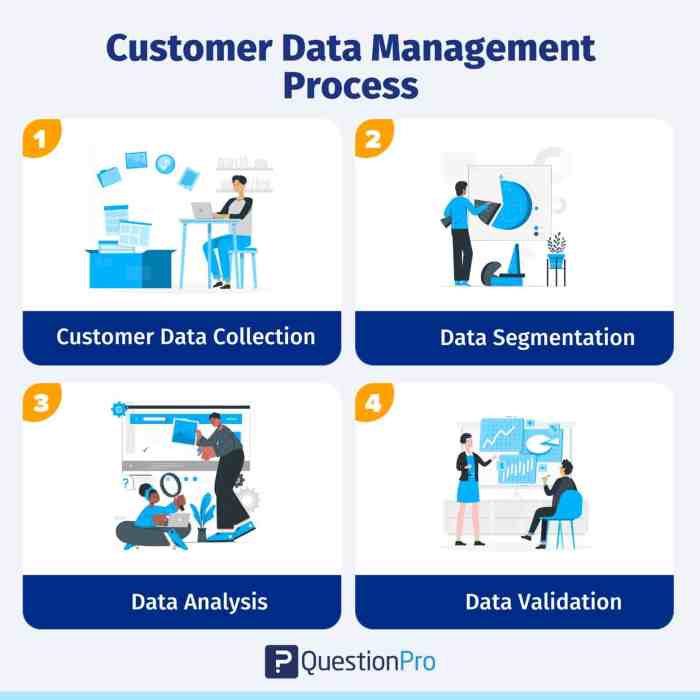Importance of customer data management is crucial in today’s business landscape, where understanding and utilizing customer data can make or break a company’s success. In this digital age, harnessing the power of customer data not only improves marketing strategies but also enhances overall customer experience.
As companies strive to personalize their approach and tailor services to individual needs, effective customer data management plays a pivotal role in achieving these goals. Let’s delve deeper into the significance of managing customer data efficiently and explore the strategies, tools, and technologies that can drive this process forward.
Importance of Customer Data Management

Customer data management plays a crucial role in enhancing customer experience by allowing businesses to better understand their customers’ preferences, behaviors, and needs. This leads to more personalized interactions and tailored solutions, ultimately fostering stronger relationships and loyalty.
Obtain a comprehensive document about the application of RMM mobile app functionalities and benefits that is effective.
Enhancing Personalized Marketing Strategies
Effective customer data management enables companies to segment their customer base and target specific groups with personalized marketing campaigns. By analyzing data such as purchase history, browsing patterns, and demographic information, businesses can create targeted offers and recommendations that resonate with individual customers. This not only improves the effectiveness of marketing efforts but also enhances the overall customer experience.
- Amazon is a prime example of a company that has successfully utilized customer data management to enhance its services. By tracking customers’ browsing and purchasing history, Amazon can recommend products that align with their interests, leading to increased sales and customer satisfaction.
- Retail giant Walmart also leverages customer data to personalize marketing strategies. By analyzing data on past purchases and online behavior, Walmart can send targeted promotions and discounts to customers, driving engagement and loyalty.
Strategies for Effective Customer Data Management
Effective customer data management is crucial for businesses to understand their customers better, personalize their marketing efforts, and improve overall customer experience. Here are some key strategies to ensure successful customer data management:
Identifying Key Steps in Collecting and Organizing Customer Data, Importance of customer data management
- Utilize customer relationship management (CRM) software to gather and store customer information in one centralized location.
- Implement data collection methods such as online forms, surveys, and purchase history tracking to gather valuable customer data.
- Categorize and organize customer data based on demographics, behavior, preferences, and interactions to create detailed customer profiles.
Importance of Data Accuracy and Security in Customer Data Management
Maintaining data accuracy and security is essential to build trust with customers and ensure compliance with data protection regulations. Here are key points to consider:
- Regularly update and clean customer data to eliminate duplicates, errors, and outdated information.
- Implement data encryption, access controls, and regular security audits to protect customer data from breaches and unauthorized access.
- Adopt data governance policies and procedures to ensure data quality, integrity, and compliance with privacy laws.
Benefits of Integrating Customer Data from Various Sources for a Comprehensive View
Integrating customer data from multiple sources provides a holistic view of customer interactions and preferences, enabling businesses to deliver personalized experiences and targeted marketing campaigns. Here are the advantages:
- Gain insights into customer behavior across different touchpoints, such as social media, website visits, and email interactions.
- Create unified customer profiles by combining data from sales, marketing, customer service, and other departments for a 360-degree view of the customer.
- Enhance data analysis and decision-making by leveraging integrated customer data to identify trends, predict customer needs, and optimize marketing strategies.
Tools and Technologies for Customer Data Management

In today’s data-driven world, managing customer data effectively is crucial for businesses to understand their customers better and drive successful marketing strategies. Various tools and technologies have been developed to help organizations streamline their customer data management processes.
Comparison of Customer Data Management Software
- Customer Relationship Management (CRM) Software: CRM software like Salesforce, HubSpot, and Zoho CRM help businesses manage customer interactions, track leads, and analyze customer data to improve relationships.
- Data Management Platforms (DMPs): DMPs like Adobe Audience Manager and BlueKai allow businesses to collect, analyze, and activate customer data from various sources for targeted advertising and personalized marketing campaigns.
- Customer Data Platforms (CDPs): CDPs like Segment and Tealium unify customer data from multiple touchpoints to create a single customer view, enabling personalized marketing and seamless customer experiences.
Features of a Robust Customer Data Management System
- Data Integration: A robust system should be able to integrate data from various sources such as websites, mobile apps, and social media platforms to create a comprehensive customer profile.
- Data Quality Management: Ensuring data accuracy, consistency, and completeness is essential for making informed business decisions and executing effective marketing campaigns.
- Security and Compliance: Implementing data security measures and complying with regulations like GDPR is crucial to protect customer data and build trust with customers.
Artificial Intelligence and Machine Learning in Customer Data Management
- Personalized Recommendations: AI algorithms analyze customer data to provide personalized product recommendations, improving the customer shopping experience and increasing sales.
- Churn Prediction: Machine learning models can predict customer churn by analyzing patterns in customer behavior, allowing businesses to take proactive measures to retain customers.
- Sentiment Analysis: AI tools can analyze customer feedback and sentiment to understand customer preferences and improve products or services based on customer insights.